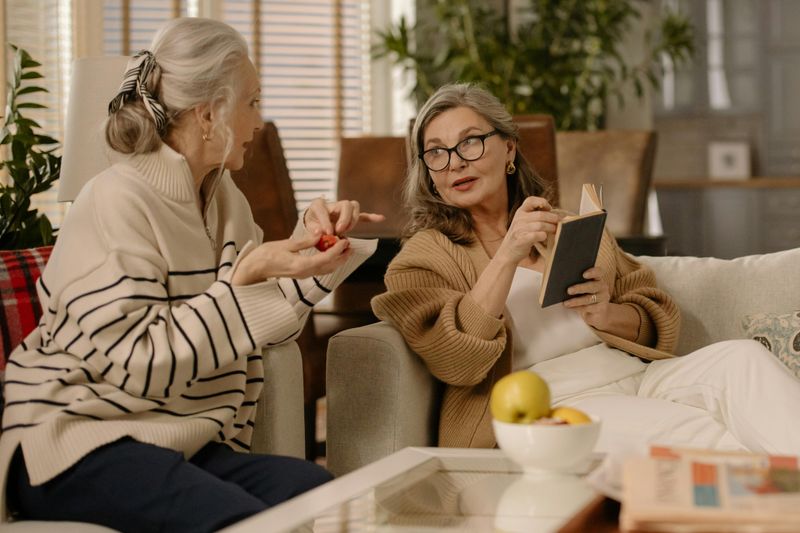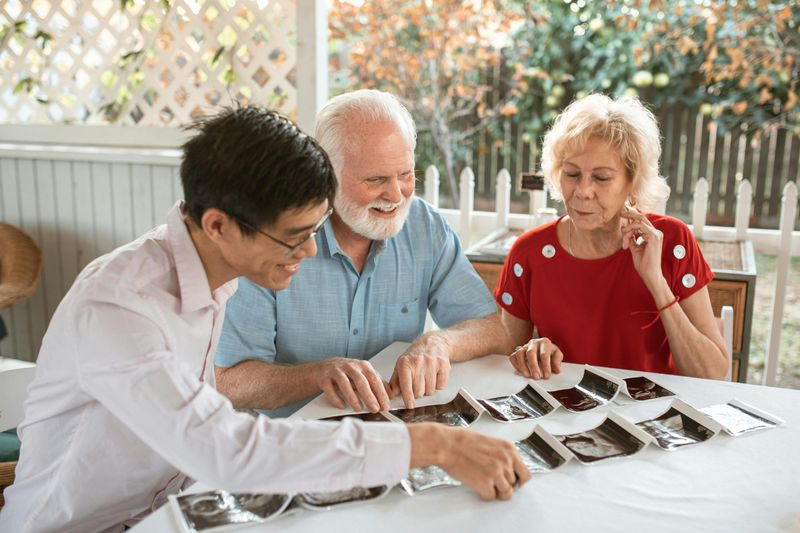Friendships and relationships transform as we grow older, often becoming richer and more meaningful. The connections we maintain through decades take on new qualities that younger relationships simply haven’t had time to develop. While youth might celebrate having hundreds of friends, our later years reveal that it’s the quality, not quantity, of relationships that truly matters. These changes don’t happen overnight but evolve gradually, bringing unexpected depth to our most treasured bonds.
1. Quality Over Quantity: The Power of Fewer, Deeper Connections
Remember those high school yearbooks filled with signatures from people whose names you can barely recall now? As we age, our social circles naturally shrink, but the remaining relationships intensify like concentrated orange juice – smaller volume, stronger flavor.
Many older adults report feeling more fulfilled with just 3-5 close friends than they did with dozens of casual acquaintances in their youth. This natural pruning process happens as life experiences reveal who truly matters.
The energy once spent maintaining numerous surface-level connections gets redirected into nurturing fewer, more meaningful relationships. These deep bonds provide greater emotional nourishment and practical support than a phone filled with contacts you rarely call.
2. Heart-to-Heart: The Rise of Emotional Vulnerability
Small talk gradually gives way to soul talk as we age. The weather and sports scores matter less than discussions about hopes, fears, and the meaning of our journeys. This shift happens naturally as time teaches us life’s brevity.
Older adults often shed the protective armor worn in youth – those carefully constructed personas designed to impress others. With decades of self-knowledge, there’s less to prove and more to share. Conversations between longtime companions frequently venture into territory that younger relationships rarely explore.
Research shows this emotional openness contributes significantly to mental wellbeing in later years. The freedom to be authentically yourself, completely known and accepted by another person, creates a sanctuary unlike any other human experience.
3. Memory Keepers: Sharing Decades of Life Together
“Remember when…” becomes a powerful phrase between longtime companions. Those who’ve witnessed our lives unfold become irreplaceable treasure chests of shared history. They remember versions of us that even we might forget.
Long-term friends celebrate anniversaries of both triumphs and tragedies. They’ve attended our weddings, held our babies, and helped bury our parents. This shared timeline creates a unique language of references, inside jokes, and unspoken understandings.
The value of having someone who remembers your younger self grows immeasurably with age. When memories begin to fade, companions serve as living photo albums, helping each other maintain connection to their full life stories and preserving personal histories that might otherwise be lost.
4. Accepting the Whole Package: Less Judgment, More Understanding
Youth often involves trying to change friends to match our ideals. Maturity brings the wisdom to stop trying to fix people and start appreciating their authentic selves – quirks, flaws and all.
Longtime companions develop a beautiful acceptance of each other’s unchangeable traits. The annoying habits that might have ended a friendship in your twenties become endearing characteristics in your sixties. “That’s just how she is” transforms from criticism to affectionate acknowledgment.
This acceptance stems partly from self-acceptance. As we make peace with our own imperfections, we extend that same grace to others. Aging companions learn to distinguish between harmful behaviors worth addressing and harmless eccentricities worth embracing as part of what makes each person uniquely themselves.
5. Standing Together Through Health Challenges
When health issues emerge, longtime companions reveal their true value. They drive us to doctor appointments, remember the questions we forgot to ask, and translate medical jargon into understandable terms.
Physical changes that might embarrass us with newer acquaintances become manageable with trusted companions. They adjust activities to accommodate changing abilities without making it feel like a burden. The friend who once hiked mountains with you happily switches to coffee dates when your knees can’t handle trails anymore.
Studies consistently show that strong social connections improve health outcomes for older adults facing illness. Beyond practical help, knowing someone truly cares provides powerful psychological medicine. The companion who sits quietly during chemotherapy or calls daily during depression can literally become a lifeline.
6. Weathered Wisdom: Handling Conflicts with Perspective
Young friendships often fracture over minor disagreements. Mature companions develop conflict resilience – knowing that temporary tensions don’t erase decades of connection. The petty scorekeeping of youth gives way to genuine forgiveness.
Long-term companions learn which battles matter and which don’t. Having weathered genuinely difficult life circumstances together creates perspective about what constitutes a real problem versus a momentary irritation. The argument that might have ended a friendship at 25 becomes a brief bump in the road at 65.
This evolution happens naturally as we experience life’s true hardships. Companions who’ve supported each other through serious illness, loss of loved ones, or major disappointments develop an emotional immune system that can handle minor conflicts without relationship-threatening inflammation.
7. Lifelines of Longevity: Why Companionship Becomes Essential
Numerous studies reveal a startling truth: social isolation can be as harmful to health as smoking 15 cigarettes daily. As we age, meaningful companionship transforms from a pleasant addition to life into a critical component of wellbeing.
Regular social interaction keeps our brains active and engaged. Conversations require complex cognitive processing, memory recall, and emotional intelligence – all excellent exercises for maintaining mental sharpness. Even simple activities like playing cards or discussing books provide valuable mental stimulation.
The accountability that comes with companionship often improves physical health too. We’re more likely to take medications correctly, eat proper meals, and stay physically active when we have friends who notice and care about our habits. The friend who asks “Did you call the doctor about that pain?” may be extending your life.
8. Just Being There: The Comfort of Quiet Companionship
Young friendships often revolve around doing things – concerts, sports, parties. With age comes the discovery that simply being together holds its own special joy. The pressure to constantly entertain each other fades away.
Mature companions can sit comfortably in silence, reading books side by side or watching a sunset without feeling compelled to fill every moment with conversation. This quiet togetherness represents profound trust – knowing you’re accepted without needing to perform or impress.
This shift happens gradually as relationships deepen. The presence itself becomes more valuable than any activity. Many older adults describe their deepest companionship moments not as grand adventures but as ordinary afternoons spent in comfortable silence, each person aware of and grateful for the other’s presence.
9. Relationship Masters: Applying Decades of Wisdom
By our later years, we’ve accumulated invaluable relationship skills through thousands of interactions. We’ve learned which battles to fight and which to surrender. We understand that most disagreements stem from miscommunication rather than malice.
Mature companions excel at reading each other’s emotional states. They notice subtle changes in tone or expression that newer acquaintances might miss. This emotional intelligence allows them to provide support even when it’s not explicitly requested.
The patience developed through decades of relationships becomes one of aging’s greatest gifts. Small irritations that once seemed relationship-threatening now appear as minor bumps on a long road. This wisdom creates space for imperfection while maintaining meaningful connection – perhaps the most valuable relationship skill of all.
10. Carrying Each Other’s Stories: Creating Legacy Together
As we age, the question of legacy becomes increasingly important. Who will remember us? Who will understand what our lives meant? Longtime companions become custodians of each other’s stories, preserving memories that might otherwise fade away.
There’s profound comfort in knowing someone else carries pieces of your history. The friend who remembers your parents, your first apartment, your career struggles, and your greatest triumphs holds irreplaceable parts of your identity. They connect you to your full life story.
This story-keeping function grows especially vital for those without children or whose families live far away. Companions often become family by choice, carrying forward important memories and values. The photos you’ve taken together, the traditions you’ve created, and the stories you’ve shared become a living legacy that enriches both lives.










